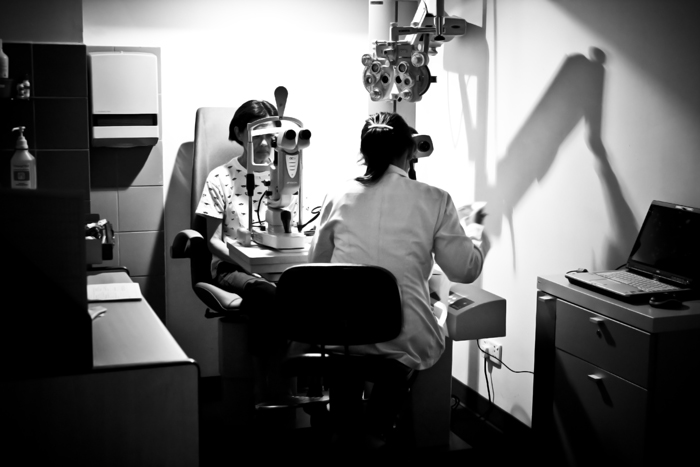|
7/25/2015 0 Comments So You Want To Be An Optometrist?
By Lakshini Mendis
Optometrists are health-care professionals who provide primary vision care. Their area of expertise includes the eye and its related structures, as well as visual information processing in humans.
To become an optometrist in the U.S., you need to complete a Doctor of Optometry (O.D.) and pass a national exam administered by the National Board of Examiners in Optometry. The O.D. degree is a 4-year post-graduate program, which includes classroom training and clinical experience. Entry into the O.D. program is competitive, and requires the applicant to sit the Optometry Admission Test, in addition to a bachelor’s degree (in a recognized area of study). You can find a comprehensive list of Optometry schools and colleges that are based in the US here.
According to the Bureau of Labor Statistics, in 2011, optometrists earned a median annual salary of $94,690. The job market is estimated to grow by 24%, which is much faster than the average for all occupations through 2020. However, it’s important to remember that since this is a relatively small occupation, this increase may not result in as many jobs as you’d expect. Nonetheless, optometrists are employed in a diverse range of work environments from retail stores to hospitals. There are also many opportunities to get involved outreach programs. But what is working as an optometrist really like? Scientista chatted to Lily Chang and Maria Pais to find out. What attracted you to this profession? Lily: The fact that optometrists are primary health providers and are able to have interaction with different people, on a day to day basis. There’s a lot of evidence based learning and problem solving too, which keeps the job interesting. Maria: I have always been interested in people and health care, even as a young child. Optometry enables you to be involved in a very personal and sensitive part of health industry, giving you the tools to really take care of the person. Sight is such an important sense that influences one’s life in a profound way. Optometry also enables you to really be involved in the care of the family because it offers a variety of different specialties. I’m also a very methodical and particular person, and as this profession demands both attributes, optometry suits my personality perfectly! What do you think are some of the characteristics an optometrist should have? Lily: Compassion, patience, being analytical, and being able to relate to people. Maria: An optometrist needs to be: methodical, particular, a perfectionist, patient, caring, an effective communicator, able to think outside the box, a problem solver, kind, compassionate, and be able to work in a team. What is your typical day like? Lily: Each day is different. Some days I see a lot of patients with glaucoma and other chronic age-related eye problems. And other days I deal with people who just requires simply contact lenses or glasses to correct their vision. But the more “exciting” things like eye infections and urgent cases like retinal detachment usually happen late afternoon on a Friday, which can be a bit stressful but at least you know the patient will be well looked after once you send them through to the acute eye clinic. Maria: Really variable! My clinical practice has a significant focus on ocular disease, geriatric eye care, and pediatrics. My day consists mainly of patient examinations, choosing optical devices, repairing and adjusting spectacles, writing reports, maintaining our practice website, marketing responsibilities, and ordering children’s frames. What is the best thing about being an optometrist? Lily: You’re constantly meeting new people and interacting with them, but I find it the most rewarding when your patients keep coming back to you year after year because they trust your professional skills/opinion. Even better when they start bringing family members and friends to you too. Maria: Taking care of people! I’ve been practicing as an optometrist for 14 years. I have been at my current practice for 10 years, where I’ve been building community and walking alongside the people in my area. Serving them in taking care of their eyes has been rewarding. The eye is also extremely interesting structure and I really enjoy figuring out how to manage the particularly complex ocular conditions. I love challenges! Have you faced any challenges (either in your training or career as an optometrist)? How did you overcome them? Lily: When I was training to be an optometrist there are times when you wish you could have managed the patient better or done certain things more efficiently. Like a lot of other things practice makes perfect and I would encourage student optometrists not to be disheartened just because they feel they are not hitting the mark just yet – make the most of your time in training to perfect your skills so you’re well equipped when you go out in the “real world”. You will be facing a lot of different personalities at work, and as a clinician and also a “customer service provider” do your best to look after your patients but don’t take things personally if people treat you with a negative attitude – they are probably just having a bad day. Maria: I had to work very hard through university (and I did)! There are challenges in every profession, so yes, I have faced a few. I have always maintained my ethical views built on the foundation of my Christian faith and this has been a real help and guide for me in my professional decisions. I made a decision early in my profession that my ethical values and excellent patient care were two things I would always strive to maintain in every situation. What do you think the job outlook is like for optometry? Lily: Good! There are lots of opportunities out there for optometrists to work as a clinician, as consultants for optical product companies, and as academics. Maria: While it is pretty difficult to get a job in independent practices in Auckland (where I work) at the moment, the outlook nationally and internationally looks good. Do you have any advice for someone considering a career as an optometrist? Lily: Work hard, treat your patients with compassion and respect, look after yourself and have a balanced life! Maria: You have got to be willing to work very hard and you have to really love taking care of people. People often come to you in a vulnerable state requiring meticulous care and patience. For more information check out the American Optometric Association. 
About the Author
Scientista’s co-editor-in-chief, Lakshini Mendis, works on understanding how the human brain changes in Alzheimer’s disease. She is a strong advocate for women in STEM and good science communication. She also writes for HDBuzz. When she's not working, you can usually find Lakshini curled up with a good book, spending time with family and friends, or exploring somewhere new! Follow her musings on Twitter. Comments? Leave them below!
0 Comments
Your comment will be posted after it is approved.
Leave a Reply. |
CONNECT WITH USSUBSCRIBE |
The Scientista Foundation, Inc. All Rights Reserved © 2011-2021 | Based in NY | [email protected]
The Network for Pre-Professional Women in Science and Engineering
The Scientista Foundation is a registered 501(c)(3) -- Donate!
The Network for Pre-Professional Women in Science and Engineering
The Scientista Foundation is a registered 501(c)(3) -- Donate!



 RSS Feed
RSS Feed